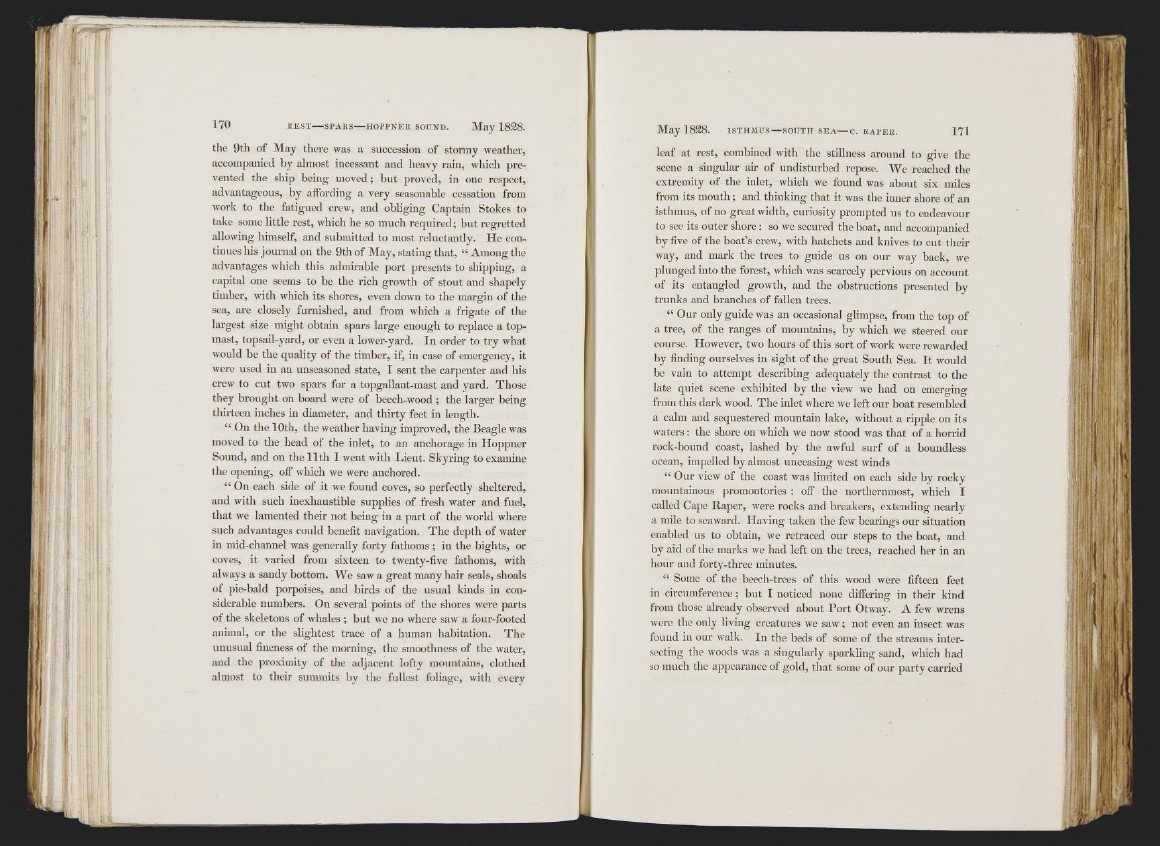
t i
the 9th of May there was a succession of stormy weather,
accompanied by almost incessant and heavy rain, which prevented
the ship being moved; but proved, in one respect,
advantageous, by affording a very seasonable cessation from
work to the fatigued crew, and obliging Captain Stokes to
take some little rest, which he so much required; but regretted
allowing himself, and submitted to most reluctantly. He continues
his journal on the 9th of May, stating that, “ Among the
advantages which tliis admirable port presents to shipping, a
capital one seems to be the rich growth of stout and shapely
timber, with which its shores, even down to the margin of the
sea, are closely furnished, and from which a frigate of the
largest size might obtain spars large enough to replace a topmast,
topsail-yard, or even a lower-yard. In order to try what
would be the quality of the timber, if, in case of emergency, it
were used in an unseasoned state, I sent the carpenter and his
crew to cut two spars for a topgallant-mast and yard. Those
they brought on board were of beech-wood ; the larger being
thirteen inches in diameter, and thirty feet in length.
“ On the 10th, the weather having improved, the Beagle was
moved to the head of the inlet, to an anchorage in Hoppner
Sound, and on the 11th I went with Lieut. Skyring to examine
the opening, off which we were anchored.
“ On each side of it we found coves, so perfectly sheltered,
and with such inexhaustible supplies of fresh water and fuel,
that we lamented their not being in a part of the world where
such advantages could benefit navigation. The depth of water
in mid-channel was generally forty fathoms ; in the bights, or
coves, it varied from sixteen to twenty-five fathoms, with
always a sandy bottom. We saw a great many hair seals, shoals
of pie-bald porpoises, and birds of the usual kinds in considerable
numbers. On several points of the shores were parts
of the skeletons of whales ; but we no where saw a four-footed
animal, or the slightest trace of a human habitation. The
unusual fineness of the morning, the smoothness of the water,
and the proximity of the adjacent lofty mountains, clothed
almost to their summits by the fullest foliage, with every
leaf at rest, combined with the stillness around to give the
scene a singular air of undisturbed repose. We reached the
extremity of the inlet, which we found was about six miles
from its mouth; and thinking that it was the inner shore of an
isthmus, of no great width, curiosity prompted us to endeavour
to see its outer shore : so we secured the boat, and accompanied
by five of the boat’s crew, with hatchets and knives to cut their
way, and mark the trees to guide us on our way back, we
plunged into the forest, which was scarcely pervious on account
of its entangled growth, and the obstructions presented by
trunks and branches of fallen trees.
“ Our only guide was an occasional glimpse, from the top of
a tree, of the ranges of mountains, by which we steered our
course. However, two hours of this sort of work were rewarded
by finding ourselves in sight of the great South Sea. It would
be vain to attempt describing adequately the contrast to the
late quiet scene exhibited by the view we had on emerging
from this dark wood. The inlet where we left our boat resembled
a calm and sequestered mountain lake, without a ripple on its
waters: the shore on which we now stood was that of a horrid
rock-bound coast, lashed by the awful surf of a boundless
ocean, impelled by almost unceasing west winds
“ Our view of the coast was limited on each side by rocky
mountainous promontories : off the northernmost, which I
called Cape Baper, were rocks and breakers, extending nearly
a mile to seaward. Having taken the few bearings our situation
enabled us to obtain, we retraced our steps to the boat, and
by aid of the marks we had left on the trees, reached her in an
hour and forty-three minutes.
“ Some of tlie beech-trees of this wood were fifteen feet
in circumference; but I noticed none differing in their kind
from those already observed about Port Otway. A few wrens
were the only living creatures we saw; not even an insect was
found in our walk. In the beds of some of the streams intersecting
the woods was a singularly sparkling sand, which had
so much the appearance of gold, that some of our party carried